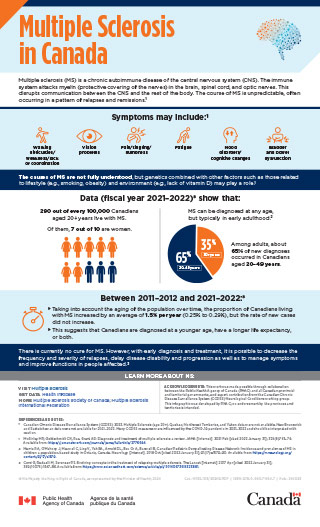Multiple Sclerosis in Canada

Download the alternative format
(PDF format, 208 Kb, 1 page)
- Organization: Public Health Agency of Canada
- Date published: May 2024
Multiple sclerosis (MS) is a chronic autoimmune disease of the central nervous system (CNS). The immune system attacks myelin (protective covering of the nerves) in the brain, spinal cord, and optic nerves. This disrupts communication between the CNS and the rest of the body. The course of MS is unpredictable, often occurring in a pattern of relapses and remissions.Footnote 1
Symptoms may include:Footnote 1
- walking difficulties/weakness/lack of coordination
- vision problems
- pain/tingling/numbness
- fatigue
- mood disorders/cognitive changes
- bladder and bowel dysfunction
The causes of MS are not fully understood, but genetics combined with other factors such as those related to lifestyle (e.g., smoking, obesity) and environment (e.g., lack of vitamin D) may play a role.Footnote 1
Data (fiscal year 2021–2022)Footnote * show that:
- 290 out of every 100,000 Canadians aged 20+ years live with MS; of them, 7 out of 10 are women.
- MS can be diagnosed at any age, but typically in early adulthoodFootnote 2; among adults, about 65% of new diagnoses occurred in Canadians aged 20-49 years, while 35% of new diagnoses occurred in Canadians aged 50+ years.
Between 2011–2012 and 2021–2022:Footnote *
- Taking into account the aging of the population over time, the proportion of Canadians living with MS increased by an average of 1.5% per year (0.25% to 0.29%), but the rate of new cases did not increase.
- This suggests that Canadians are diagnosed at a younger age, have a longer life expectancy, or both.
There is currently no cure for MS. However, with early diagnosis and treatment, it is possible to decrease the frequency and severity of relapses, delay disease disability and progression as well as to manage symptoms and improve functions in people affected.Footnote 3
Learn more about MS
- Visit Multiple Sclerosis
- Get data Health Infobase
- More
Acknowledgements
This work was made possible through collaboration between the Public Health Agency of Canada (PHAC) and all Canadian provincial and territorial governments, and expert contribution from the Canadian Chronic Disease Surveillance System (CCDSS) Neurological Conditions working group. This infographic was developed by PHAC; no endorsement by the provinces and territories is intended.